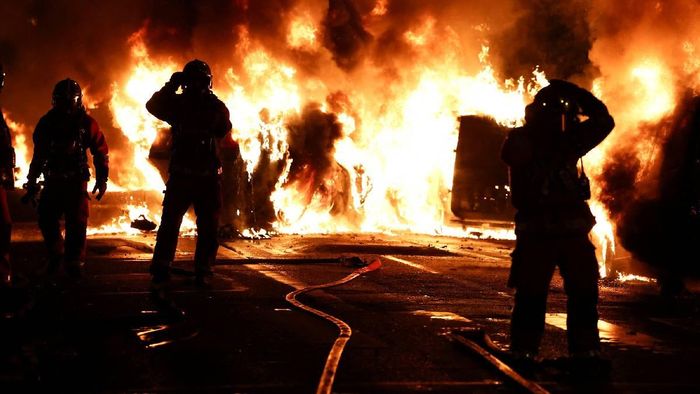Why are riots happening in France? Here’s what you all need to know
A wave of protests swept France following the shooting of a 17-year-old youth by a cop near Paris on June 27, sparking a ban on demonstrations, travel warnings issued, and reigniting debate about excessive policing in marginalized communities.

- Jul 02, 2023,
- Updated Jul 02, 2023, 9:50 AM IST
A wave of protests swept France following the shooting of a 17-year-old youth by a cop near Paris on June 27, sparking a ban on demonstrations, travel warnings issued, and reigniting debate about excessive policing in marginalized communities.
Scenes arose of individuals torching vehicles and moving onto buildings, smashing windows while riot cops facing angry protesters.
As part of his second term, French President Emmanuel Macron held an emergency meeting with ministers in response to the uprisings, which prompted a crisis response.
What started the protests?
Earlier this week, during a traffic stop in the Paris suburb of Nanterre, the teenager Nahel, who was of Algerian descent, was shot and killed by a police officer.
A video clip of the episode caught by a bystander showed two officials standing on the driver's side of the vehicle, one of whom released his weapon at the driver regardless of not seeming to confront any quick danger.
Pascal Prache, a prosecutor in Nanterre, said that the officer said he fired his gun because he was afraid the boy would hit someone with the car.
Prache said that it is believed the officer acted illegally in using his weapon. He is currently facing a formal investigation for voluntary homicide and has been placed in preliminary detention.
Aftermath of the incident
In response to Nahel's death, protesters have been holding signs that read "the police kill," and hundreds of government buildings have been damaged.
In Paris alone, 5,000 security forces have been deployed to bring the situation under control. According to French Interior Minister Gerard Darmanin, officers were given the authority to quell riots, make arrests, and "restore republican order."
Violent protests have also occurred in French overseas territories. A man was killed by a "stray slug" in Cayenne, capital of French Guiana, during riots on Thursday.
What caused the uproar?
Activists believe that Nahel's race played a role in his death, easing tensions about police discrimination in France against minoritized communities.
Secularism - known as "laïcité" in French - is a vital underpinning of French culture, as it looks to maintain balance for all by eradicating markers of distinction, including race.
However, many people of color in France claim that they are more likely than White people to be the victims of police brutality. A recent report by the Privileges Protectors, a free basic liberties guard dog in France, viewed that young fellows saw as Dark or Middle Easterner were multiple times bound to be come by police than their companions.
Allegations of mercilessness have long tormented French police. The Chamber of Europe scrutinized "exorbitant utilization of power by state specialists" in an explanation recently during challenges Macron's disagreeable benefits changes.
Several Rights Groups have blamed French police for ethnic profiling and have suggested profound, foundational change to address the segregation.
How does this affect Macron?
After weeks of protests against unpopular pension reforms earlier this year, Macron gave himself a deadline of one hundred days to heal the nation and restart his presidency. However, the widespread protests are now likely to hinder hopes for a reset. While cars burned and buildings were vandalized across the country on Wednesday, Macron's attendance at an Elton John concert was widely reported.
The French government is working to avoid a repeat of 2005, when three weeks of rioting and the deaths of two teenage boys hiding from police sparked a state of emergency.
In fact, Macron skipped a European Council summit in Brussels that was supposed to last until Friday. He said that all "large-scale events" in France, including "celebrations and numerous gatherings," would be banned, and he urged parents to keep their children at home, saying that many of those detained were young.
Also read : France riots: Over 667 arrested in fourth night of unrest after teen shot dead by police